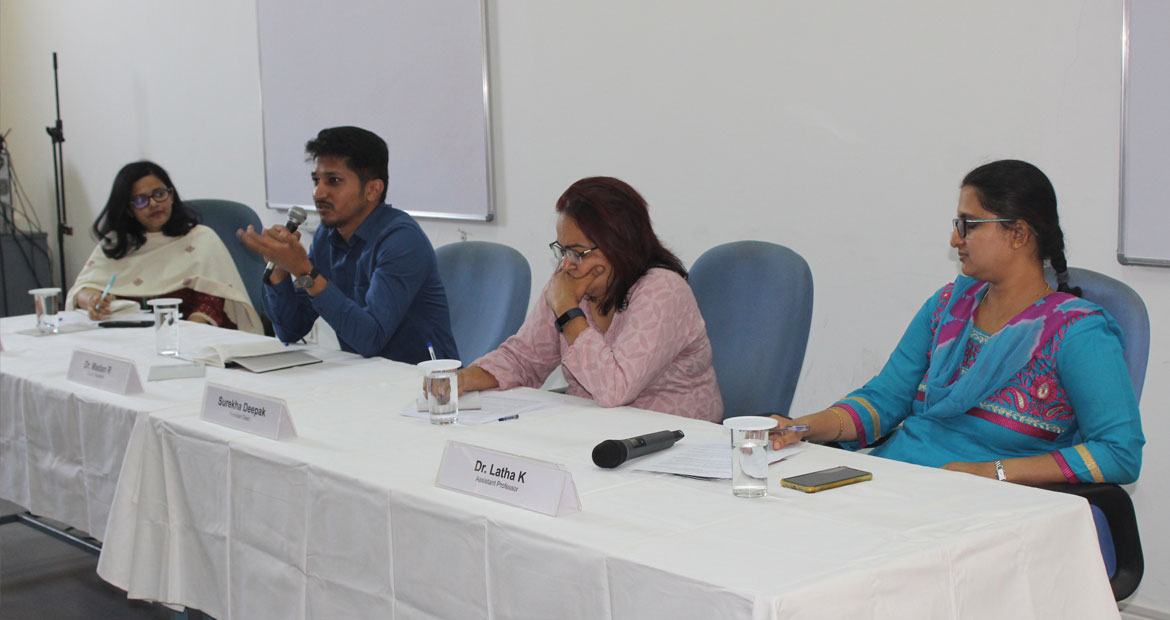
‘Journalists should separate their professional, personal lives’
Need to consult experts and collaborate with them, say panelists at discussion
Media professionalssuffer fromstress and other mental health issuesduring their work, especially while covering crime, accidents and deaths. They should take care of their well-beingwith help frommental health professionals, said participants in a panel discussion at IIJNM on March 27. Also, they need to use proper terms while reporting such news.
Dr R. Madan, senior resident in the department of psychiatryat the National Institute of Mental Health and Neurosciences(Nimhans), said: “Media understanding mental health is important. Take care of your health by exercising, following a gooddiet and having enough sleep. Planning your day, being mindful of your surroundings, and reaching out to close ones will help to manage stress.”
Going on vacations helps people manage stress as they “take us to a new environment and give us a new perspective”,he added.
Prof. Surekha Deepak, assistant dean of IIJNM, said:“Given the work atmosphere, there is no time for reporters to show concern about colleagues;such is the nature of the job. Also, reporters are exposed to covering accidents or crime, which causes stress. Young people shouldlearn how to handle stress first and then learn to report.”
The discussion veered to how journalists should not get attached to their stories as such attachment can lead to distress.
Dr Madan said: “One should learn to draw a line between one’s professional and personal lives. This will help to eliminate stress and avoid mental illness.”
Moving on to stress caused to the readers by media’s reporting on crime, and use of jargon or sensitive words, the panel discussed the importance of collaboration between mental health and media professionals.
“The terms and keywords used in reports need to be sensitive. Terms like ‘violent’ and ‘psycho’ will have a lot of impact on those going through distress. Before reporting sensitive news, the reporter should do homework and get in touch with a mental health professional to know how to deal with such situations,” said Dr K. Latha, assistant professor in the department of mental health education at Nimhans.
The panelists discussed the positive effects of stress. Dr Madan said: “Stress helps us to come out of our comfort zone. Stress is needed.Working continuously keeps one active and helps in functioning well.”
WHO has said that 1 in 4 people faces a mental health issue at least once in life. Suicide is a leading cause of deaths worldwide.
Prof. Surekha said:“There should be no usage of a few words, jargon and sensitive terms while reporting. There should be sensitivity in asking questions. Reporters should do their homework on how to ask questions.”
Media should collaborate with professionals to make people aware about mental health services available around them, said Dr Madan.Media play an important role in bridging the gap between professionals and those suffering from mental health issues.
Sometimes people think twice before consulting a mental health professional because of the stigma surrounding these problems. But one must consult a doctor, he added.
New methods of consultation are available to eliminate stigma.“Like a first-aid kit, there is a first-aid kit for mental health: tele-MANAS. This helpline number provides mental health services by counsellors through calls. There will be face-to-face consultations and 24/7 services soon.”
Dr Latha added: “Mental health institutions are looking into mobile applications. There is an app called Mindnotesfrom Nimhans for free mental health consultation. Also, there are community health centres…. Every centre has a trained nurse.”
Thepanel discussion was followed by an interactive session. Members of the audience asked questions on how to deal with mental health issues, stress, and the availability of mental health issues in rural areas.
When asked whether a psychologist or a psychiatrist should be contacted first, Dr Madan said: “One should first consult either of them. After the consultation, the person will get clarity.”
People must await the results patiently. “Mental health drugs take time to show results, at least six to seven weeks.”
Dr Latha said the family physician has a role to play in such situations. “The family physician has an idea about your background and health.” One should consult him directly rather than first visiting a psychologist or a psychiatrist.
About mental health services available in rural areas, Dr Madan said people living in villages do not even know if they are suffering from mental health issues. “People suppress their illness and do not consult a doctor until it is serious.”
The session concluded withProf. Surekha talking about how to balance a story by getting an expert point of view and following reporting ethics while talking to sources.
Sumedha Bordoloi, a fellow at the Nimhans department of mental health education, moderated the discussion.
By Navya Sruthi
